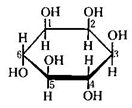CAS No: 87-89-8
Chemical Name: Cyclohexanehexol
Molecular Formula: C6H12O6
Molecular Weight: 180.15
Chemical Structure:

Inositol is often considered
a member of the B complex family of vitamins, unofficially
referred to as ¡®vitamin B8¡¯.
It is present in all animal tissues, with the highest
levels in the heart and brain. Inositol and choline
combine to produce lecithin, a type of lipid that is
needed to form healthy membranes for every living cell
in the body. Lecithin helps keep the brain, heart, and
liver healthy, and aids in the absorption of thiamin
(vitamin B1) and vitamin A, and works closely with choline
to move fats out of the heart and liver, as an aid in
the redistribution of body fat.
as a component of lecithin, helps to prevent the high
cholesterol levels and the hardening of the arteries
caused by cholesterol buildup.
Inositol is also vital for hair growth, promotes healthy
hair and prevents hair from falling out.
It has also been said to have a calming effect on the
nervous system, inositol may also be involved in depression.
People who are depressed may have lower than normal
levels of inositol in their spinal fluid. In addition,
inositol participates in the action of serotonin, a
neurotransmitter known to be a factor in depression.
(Neurotransmitters are chemicals that transmit messages
between nerve cells.) For these two reasons, inositol
has been proposed as a treatment for depression.
Bacteria in the intestines convert the phytic acid found
in plant fibers into inositol, so the body is able to
manufacture its own supply of this substance. Dietary
sources of inositol include nuts, beans, wheat and wheat
bran, cantaloupe, and oranges, which supply a substance
called phytic acid.
Some symptoms of inositol deficiency are arteriosclerosis,
constipation, hair loss, high cholesterol, irritability,
mood swings, and skin eruptions.
heavy coffee drinkers should probably consider taking
supplemental inositol.
Standard: NF12
Packing: 25kg/drum
Storage: Keep container tightly closed.
Keep container away from light, heat in a cool, well-ventilated
area.
|
